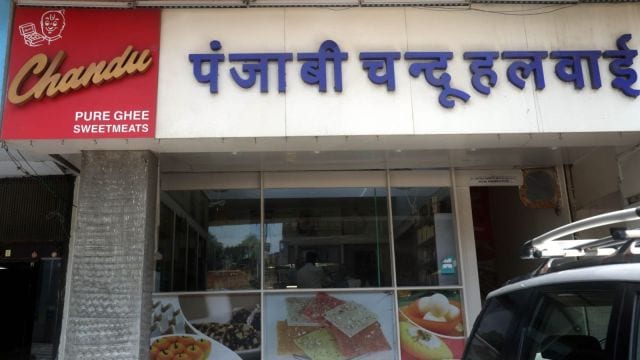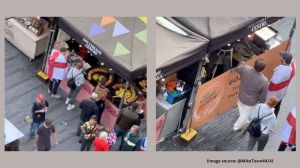Around Town: Started in 1896 in Karachi, rebuilt after Partition — here’s how a Sindhi family made Punjabi Chandu Halwai a South Mumbai icon
Today, Punjabi Chandu Halwai offers over 300 varieties of sweets at its stores in Mumbai and is sought out for its Karachi Halwa as well as Bombay Ice Halwa, among others.
 Chandu halwai was originally established in Karachi (Undivided India) (Express Photo by Amit Chakravarty)
Chandu halwai was originally established in Karachi (Undivided India) (Express Photo by Amit Chakravarty)In 1896, Seth Chandulal established a sweet shop in Karachi and named it Punjabi Chandu Halwai. By the 1940s, the business, then helmed by his son Sadajivatlal Chandulal Bahl, grew into a household name with three branches and a central factory in Karachi.
The Partition, however, dealt a heavy blow. Sadajivatlal fled overnight to India with his wife, young son Bharat Bhushan, and a newborn daughter. “We were completely destroyed. My father risked his life, returning to Karachi again and again to sell our assets and salvage whatever he could,” recalled Bharat Bhushan Bahl as he sat in his office behind the Walkeshwar store.
What he salvaged became the seed capital for Punjabi Chandu Halwai in Bombay, beginning with a shop in Zaveri Bazaar’s Laxmi Building, followed quickly by branches in Grant Road and Colaba.
“About 20 to 25 people working with us in Karachi were also uprooted. All of them were brought to Bombay and established in our business by my father,” said Bharat, adding that his father chose Bombay because “it was a port city, just like Karachi.”

Carrying on the family business
If the Partition had forced Sadajivatlal into the business of survival, for his son Bharat, continuity was the obvious — and only — choice. He joined the shop the day he finished his BCom examinations. “The issue of independence of a grown-up child is a modern concept. In traditional families like ours, the son had to carry on the father’s business,” he said. Now in his 80s, Bhushan cuts a sharp figure in a crisp shirt and trousers, speaking with a rare clarity. He often closed his eyes as if dictating, punctuating his memories with commands like “enter” and “para.”
His own sons had more freedom. Nitin, now 55, became an electronics engineer and Sachin, 50, a chemical engineer with an MBA before both returned to join the mithai business. “I gave them full freedom for their studies,” said Bharat, “but with our family being small, it was necessary for them to continue the tradition.” Yet he acknowledged that for the generation after them, things would be different. “They must have the option to decide whether they want to carry on the family business or choose a profession of their own.”
The next quarter of a century saw Sadajivatlal and Bharat establish 11 mithai shops across South Bombay, Dadar, Worli, Bandra, Santacruz, Sion and Ghatkopar, all owned and operated by the family, alongside a 7,000 sq ft central facility on Grant Road. “We are the third and fourth generation carrying forward his legacy,” said Bharat, joined in the office by his sons.

Karachi Halwa: the signature sweet
Today, the 129-year-old brand offers over 300 varieties of sweets. Their range spans barfis and pedas, Bengali favourites like sandesh and rasgulla, Maharashtrian staples like methi laddoo, and North Indian classics such as gujiya, ghevar, pinni, and besan laddoo. Their dry fruit specialities — kaju katli, pista lonj, anjeer and date-based sugar-free mithai — remain perennial bestsellers. Alongside sweets, they also serve a wide array of savouries from mathri and samosas to dhokla and wafers. About a decade ago, Sachin expanded into a bakery with Tosita, offering Shrewsbury biscuits and cookies, some made with millets.
Their signature item, however, continues to be Karachi Halwa — a chewy, glossy, jelly-like mithai made primarily from wheat starch and flavoured with cardamom and nuts. Said to have originated in Karachi, the halwa travelled with Partition-era halwais to Bombay, where it earned the moniker “Bombay Halwa.” At Chandu, an orange version topped with almonds is also known as Chandu Halwa.
“The halwa from Sindh has virtually gone extinct. That skill is dying in Bombay,” said Bharat Bhushan. While some Sindhi manufacturers continue in Delhi, he added, it is no longer available here in the same variety. Sachin pointed out another long-standing specialty: Bombay Ice Halwa, also known as Mahim Halwa, a sweet made from cornstarch, milk, sugar, and ghee rolled into thin sheets. “It is massively popular among Gujaratis, and we have been making and selling it for over 60 years,” he said.
While their most sold items change with the seasons — modaks during Ganesh Chaturthi, halwas and laddoos in winter — the busiest time is always Diwali, when kaju katli rules. “We sell in tonnes,” said Nitin, as Sachin offered us a piece, noting that only the highest-quality cashews are used.
Recipe for success
Interestingly, their last shop was opened in 1975 in Santacruz (West). Unlike most mithai businesses, Punjabi Chandu Halwai never expanded into restaurants, franchises or additional branches. “My father, who was absolutely traditional, also had a very flourishing real estate business. I started a company that manufactures electronic goods for defence and exports, and Sachin created a bakery,” said Bharat.
“We are a small family — one father and two sons. At Punjabi Chandu Halwai, quality and consistency are everything. The sons go to the factory daily, and every final product still passes through my eyes. Expanding further would make that impossible.”
The secret to their longevity, they say, lies in listening to customers. “Once the price of khus khus shot up, we made methi laddoo without it. They are very popular among pregnant women, and one elderly lady scolded us saying they had to have khus khus. We added it back,” recalled Sachin. “Our gond laddoos are favourites among Marwaris. When a Maharashtrian customer tried them, we told him they were dink laddoos, but he was unimpressed — apparently, they are made differently in Maharashtra. So we called our karigars and developed a version that appealed to him. That’s how we work.”








